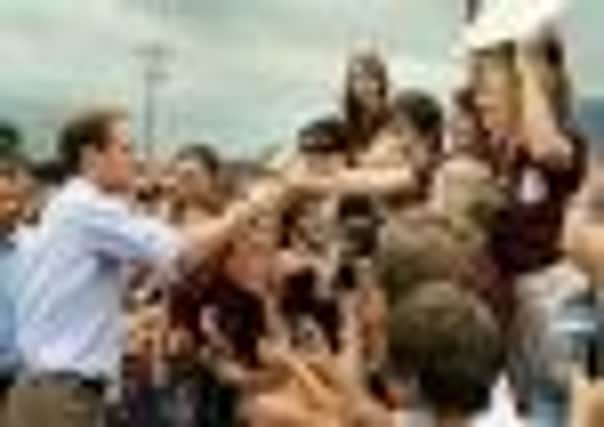Malcolm Barker: The Prince who triumphed by being himself


This was true wherever he went. Whether in cities like Christchurch, New Zealand, shattered by an earthquake, or Brisbane, Queensland, devastated by floods, or in smaller townships afflicted by natural disasters, the multitudes turned out, prompted perhaps by curiosity about the young man who first visited as an infant in arms, rather than loyalty to the Crown.
They seemed to like what they saw and heard last week. The more matronly wanted to mother the Prince, and could be heard regretting that Kate was not there to persuade him to wear a hat to protect his pate against the sun (which he notably failed to do). She might also have ensured he was covered in sun-block. The Aussies sought to feed William up a bit, mostly with barbecued sausages.
Advertisement
Hide AdAdvertisement
Hide AdThe bonny young lasses, who are in endless supply in Australia, seemed keen on smothering him. Many carried banners indicating a willingness to be his Princess, or a more direct appeal: “Marry me, Wills”. Their younger sisters just squealed, creating the kind of din my generation associated with a visit of Cliff Richard.
Prince William took all this in his stride, extricating himself politely when the throng pressed too close. He is indebted to shrewd advisors, or his own nous, or perhaps both, for striking the right note throughout, eschewing gimmicks and just being himself.
Many of the people he met had lost kinsfolk and possessions in various catastrophes. They brought pictures of home and loved ones to show him. The Royal visitor was sympathetic but never maudlin. This is what was hoped for by those he encountered, because it is important to remember that these people are the descendants of generations who fought on the Somme and Gallipoli and, in a later war, the Battle of Britain, Normandy and Burma. In short they are battlers, who wrought a nation from the bush. They have learned to shake themselves free of disaster and, in joint efforts, start their lives all over again. Anyway, if you ask, they will point across the Pacific to Japan, and say it could be worse.
Right from the start, the Prince got it right. At Christchurch, formal in a dark suit and tie, he observed the two-minute silence in company with what appeared to be the city’s entire surviving population. He quoted his grandmother, who had said that grief was the price of love.
Advertisement
Hide AdAdvertisement
Hide AdHe then addressed himself to the people of Christchurch in words broadcast across the Antipodes: “Put simply, you are an inspiration to all people. I count myself enormously privileged to be here to tell you that.” This was his message throughout. He was not honouring the people by his presence; rather, he was the one being honoured by the welcome he was receiving from those who had survived tragedy and were enduring grief.
Commentators recalled his first visit to Australia in 1983 when he arrived with Charles and Diana at the age of nine months.
His mother was like no other Royal who had visited Australia, and became an instant sensation. Last week, her elder son offered plentiful reminders of her deft touch with people. He laid sensitive hands on the shoulders of grieving women. In one vignette, he caressed a little girl who had shyly said “Hello”, while her brother looked on awe-struck, clutching his Teddy. “Thank you”, said their mother. The image that also lives in the mind’s eye is of the Prince, bare-headed and in short sleeves, holding close a Down’s Syndrome sufferer who had lost her farmhouse in the flood in Grantham, Queensland. She enclosed him in her arms. Each had something for the other.
Only time will tell how far this visit will prolong the House of Windsor’s role as Australia’s monarchy, and the Union Jack’s place in a corner of the national flag. One commentator suggests that after its rejection of a republic in a referendum some years ago, Australia is enjoying the best of both worlds: a constitutional monarchy that depends on democracy, and which is safely out of the reach of politicians.
Advertisement
Hide AdAdvertisement
Hide AdThis is a wonderful oddity, a crowned republic, and in a few short days perhaps Prince William may just have helped ensure that in the fullness of time the head of his father, then his own, will appear on Australian coinage in the place now occupied by the image of Queen Elizabeth II.
A much more short-term pointer to the impact of Prince William’s visit may come at the time of the Royal wedding next month. A commercial TV channel here is contemplating broadcasting the ceremony live in place of a footy match to which it has the rights. Now that, given Australia’s devotion to sport, really would be something.
Malcolm Barker, who is a former editor of the Yorkshire Evening Post, sent this report from Lismore, New South Wales, Australia.